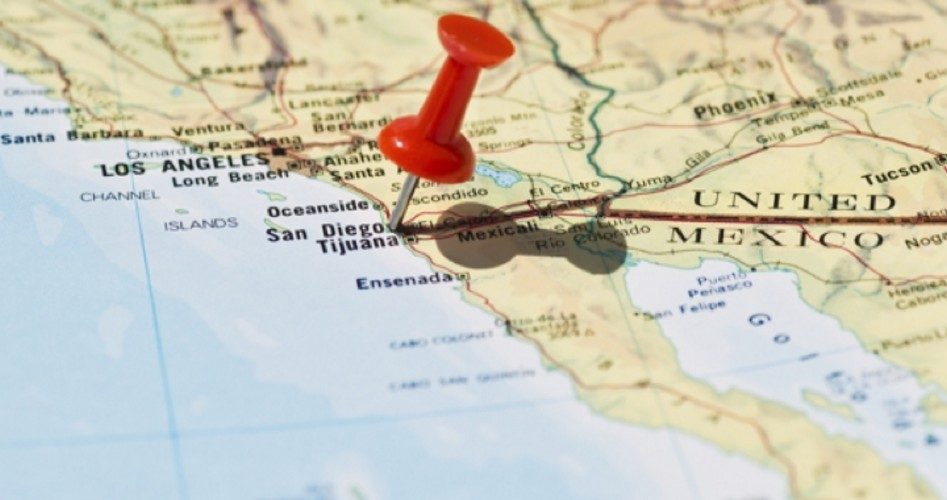
Two Pakistani nationals who have been linked to terrorism were apprehended by U.S. Border Patrol (USBP) agents south of San Diego and just north of the Mexican border in September, but details of their capture and interrogation have just recently been made public. The two detainees with suspected terrorist connections, Muhammad Azeem and Mukhtar Ahmad, from Gujrat, Pakistan, were arrested by agents on September 20. After USBP agents searched agency databases, they got hits on both men, with Ahmad being identified as an associate of a known terrorist.
The Border Patrol turned the Pakistani aliens over to U.S. Immigration and Customs Enforcement (ICE), which said that the men are being held pending immigration court proceedings.
The Washington Times, which broke the story on December 30, reported that Azeem’s data file “had been shared by a foreign government for intelligence purposes.” Both men had been questioned by immigration officials in Panama two months before being apprehended in the United States. However, Panamanian officials typically do not deport illegal aliens that they arrest if they are in transit and do not intend to stay in Panama, as was noted in an August 27 report in the Conservative Tribune. That article reported that Panama had apprehended more than 700 illegal aliens from Africa who were apparently enroute to the U.S. border, but instead of deporting them, simply allowed them to continue on their journey northward. The article quoted a statement from Domingo Flores, the Panamanian immigration supervisor for the area where the illegal African migrants were caught:
They were not deported because it is difficult to do so. Their countries of origin have no diplomatic representation in Panama and the process becomes complicated. In addition they are in transit, so you let them go.
The Times writer theorized that the two Pakistani men most likely took advantage of smuggling networks or other secretive routes commonly used by illegal immigrants to travel from Central America to the U.S. border.
The report quoted from a letter that Representative Duncan Hunter (R-Calif.) wrote to Homeland Security Secretary Jeh Johnson in December demanding to know how many people listed in the FBI’s terrorist screening database have been apprehended at the border. Duncan wrote:
The southern land border remains vulnerable to intrusion and exists as a point of extreme vulnerability.
Evidently there are criminal organizations and individuals with the networks and know-how to facilitate illegal entry into the United States without regard for one’s intentions or status on a terrorist watch list. The detention of the two Pakistani nationals underscores the fact that any serious effort to secure our homeland must include effective border security and immigration enforcement.
This incident involving the two Pakistani men with links to terrorism in their home country is but one of many cases indicative of the porous nature of our southern border and the ease with which illegal aliens — including terrorists — can enter our country. The New American has warned about this situation for years. In an article posted in 2010, “Terrorist Smuggling Into U.S. a Real Concern,” writer Joe Wolverton quoted from testimony proved by Richard Stana, the Government Accounting Office’s (GAO) director of homeland security and justice issues, before a House subcommittee on July 22, 2010. During his testimony, Stana stated, in part:
According to the National Drug Intelligence Center’s (NDIC) 2008 National Drug Threat Assessment, the southwest border region is the principal entry point for smuggled aliens from Mexico, Central America, and South America. Aliens from countries of special interest to the United States such as Afghanistan, Iran, Iraq, and Pakistan (known as special-interest aliens) also illegally enter the United States through the region,
Stana also warned that “some Mexican drug trafficking organizations specialize in smuggling special-interest aliens into the United States.”
It is noteworthy that more than five years after Spana specifically identified Pakistan as one of the nations from which smuggled aliens originated, that the flow has still not been stemmed.
One year ago, when Representative Michael McCaul (R-Texas) introduced the Secure Our Borders First Act (H.R. 399), which its sponsors claimed would improve our border security, the bill came under severe criticism from the National Border Patrol Council (NBPC), the union that represents some 17,000 Border Patrol agents and support personnel. NBPC President Kenneth Palinkas said in a statement released last January 22 that H.R. 399 “does nothing to preclude anyone in the world from turning themselves in at the U.S. border and obtaining automatic entry and federal benefits.”
Palinkas’ chief complaint about the legislation was that it lacks a procedure to quickly process those ineligible for asylum and return them to their home countries. He continued:
Almost anyone at all can call themselves an asylum-seeker and get in; it’s a global joke. It’s not border security if anyone can recite the magic words and get waved right on in. Those who arrived in the 2014 border run are still here, often living on U.S. support and even applying for U.S. jobs.
Almost a year since being introduced, the House has still not acted on H.R. 399, nor on its companion bill, S. 208. Senator Jeff Sessions (R-Ala.), one of the most outspoken members of Congress in calling for stricter enforcement of our nation’s immigration laws, posted a message on the Senate website last January about several flaws that he found with the bill. Among these are that it does not end immigrations officials’ “catch-and-release” policies, and that it does not require mandatory detention of illegal aliens and their return to their countries of origin.
Sessions said that until the catch-and-release practice is ended, “any additional funds for DHS will simply be used to facilitate the transfer of more illegal immigrants into U.S communities.” Under the present system, he charged, “illegal immigrants actually hope they will be apprehended so they can be released into an American city or town.”
Much more has happened during the past year to add another dimension to our nation’s immigration problem. With the ongoing turmoil resulting from the civil war in Syria, and much of Syria and Iraq coming under the control of ISIS terrorists, tens of thousands of refugees have fled the region, many going to Europe, and thousands more seeking asylum in the United States. While the majority of those refugees are likely victims of terrorism themselves, the task of identifying potential terrorists hiding among them is almost an impossible one. For this reason, residents of several states have opposed the relocation of these refugees within their borders.
One lesson that can be learned from the ease with which the two Pakistani men crossed our border into California is that adequate border security does not exist. If we cannot police our borders, then our ability to protect ourselves from terrorists attacks is also non-existent.
Related articles:
Border Patrol Agents’ Union Critical of McCaul Border Bill
Illegal Immigrants Charged With Murdering Border Patrol Agent
Obama Touches Briefly on Immigration; GOP Talks “Border Security”


